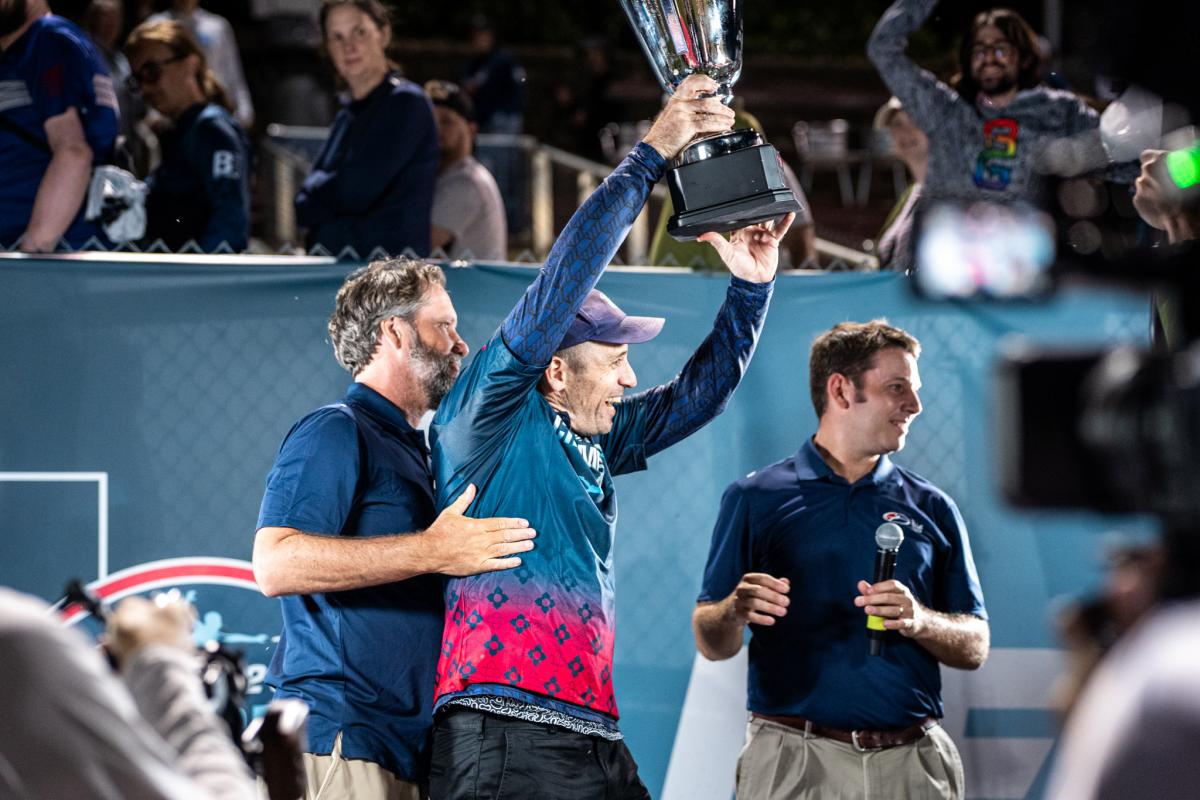August 26, 2025
By Evan Lepler
When Boston joined the UFA as an expansion team prior to the 2021 season, the organization branded itself as the ‘Glory,’ a moniker that not-so-subtly refers to the city’s illustrious ultimate history.
A quarter-century earlier, long before the advent of professional frisbee, Boston’s Death or Glory, more commonly called DoG, dominated the club frisbee universe, winning six straight national championships. Their dynastic excellence, along with New England’s continuing presence as one of the leading ultimate hubs in the early stages of the 2000s, led many to believe that Boston’s new UFA franchise would quickly rise into the upper echelon of elite contenders, capable of winning championships almost immediately.
This belief felt rational and reasonable, particularly in the aftermath of the team’s inaugural game, a brilliant 29-21 victory at Pittsburgh on June 4, 2021. That was a Thunderbirds team, by the way, that had recently played in the Central Division title game, and the Glory had completely routed them on the road, further increasing expectations that Boston could seriously threaten the other East Division powerhouse programs right away.
Of course, those opening couple campaigns for Boston ended up being far from glorious. After that initial eight-goal win, the Glory only won eight of their next 23 games, missing the playoffs in both of their first two seasons in the UFA.
“I didn’t have a full appreciation when we started what the trajectory was gonna look like,” said Boston Coach Sam Rosenthal. “It took several years for us to get the consistency.”

Over the past three seasons, however, the Glory have been gradually putting the pieces in place for a true championship push. They’ve added experienced assistant coaches, increased the standards and expectations across the roster, and obviously added several blue-chip talents.
“We started off pretty loose,” said Orion Cable, one of the eight guys from the 2021 Glory team that also competed this past weekend in Madison. “It kinda felt like a pickup team. I think it really just took a slow-build of buy-in, and here I think we kinda maxed that out.”
WATCH: 2025 UFA CHAMPIONSHIP GAME
With a special pair of MVP candidates leading the way, along with the most efficient Championship Weekend D-line that we’ve ever seen, the Boston Glory reached their ultimate potential in 2025, hoisting the Pabst Light Cup on Saturday night at Breese Stevens Field in Madison following a 17-15 victory over the Minnesota Wind Chill. It was the culmination of a half-decade-long journey, in which the Glory faced plenty of adversity, grew from their mistakes, raised their level, and earned this moment.

“The whole team played amazing,” said Tobe Decraene, who was named Championship Weekend MVP after throwing 16 assists across the semis and finals, “and it’s the only reason we’re here, because of every single one of them.”
The Full Field Layout
Championship teams are built over time, mixing elite talent with complementary players who can become stars in their roles. The modern UFA compels you to develop depth, while also requiring spectacular showcases of individual skill and complex teamwork. The whims of the frisbee can sometimes seem random, but truly great teams embrace the chaos, grind through adversity, and empower their playmakers to perform.
Boston’s journey to the 2025 title was a frenetic adventure. The offense was usually superb, led by athletic beasts like Decraene, Cable, and the great Jeff Babbitt, but this team’s greatest strength was its defense.

“There’s one thing we knew we could rely on, and it’s our defense,” said Tannor Johnson-Go, the unit’s puller, quarterback, and tireless engine.
Over the course of Championship Weekend, the Glory produced 16 breaks in 17 chances, an astonishing feat of efficiency. Bryce Merrill and Ben Feldman, the coaches of the Shred and Wind Chill, respectively, repeatedly emphasized the importance of their O-line’s D after a turnover, but neither Salt Lake nor Minnesota’s offensive group could figure out a way to dispossess Boston’s remarkably patient, organized, and skilled collection of break-makers.
In the first half of Saturday’s final, the Wind Chill offense stayed in the game because they only surrendered three turns. All three of those giveaways became Boston breaks, but Minnesota’s D-line matched that production across a thrilling first 24 minutes of frisbee.
At halftime, the Glory and Wind Chill were even, tied 11-all, and seemingly poised for a down-to-the-wire finish. By the end of the night, we indeed witnessed plenty of fourth quarter drama, though not exactly how anyone could have anticipated.
While the first half was crazy close and competitive, the Boston D-line completely seized control in the third period, opening the quarter with five consecutive breaks to lead 16-11.
“We talked about a couple small adjustments at halftime,” said Rosenthal. “The big one being, just bend but don’t break and stop those upline runs from the negative space. They were killing us with it in the first half. And we went on a little run. The O-line punched in two breaks for us [after timeouts], and the D-line got three. It was a great quarter. I think it was 11 and a half minutes without them scoring. That’ll win us most games, right?”
Indeed, heading into the fourth, on offense with a four-goal lead, Boston appeared to be sitting pretty, poised to begin its sideline celebration long before the clock actually reached all zeroes. But any of those overconfident sentiments were quickly rendered premature by Minnesota’s indescribably resilient defense.
Championship pressure hits different, as do the Wind Chill. More than half of Boston’s 14 turnovers in Saturday’s title game occurred in the closing 12 minutes, as Minnesota opened the fourth with back-to-back breaks to inch within two. With 4:14 remaining, the two teams embarked on a wildly unpredictable point, with Minnesota creating four separate break chances, all of which were ultimately unfulfilled.
“That final possession was beyond crazy,” said Johnson-Go. “We got a case of the dropsies.”
But Johnson-Go and Babbitt each registered blocks on that last point too, the latter of which came with just 14 seconds remaining. After a couple completions put the game on ice, Babbitt emotionally hugged every nearby teammate, smiling widely as just the league’s second-ever four-time champion.

“It was chaotic, but I wasn’t worried,” said Babbitt, reflecting upon the final point of the night. “I knew if the offense went out, we were gonna get back to playing calm, cool, and collected. I was just gonna help reset the disc and help make sure that clock ran out.”
Babbitt finished the playoffs with 101 completions—more than he recorded during the entire regular season—and zero throwaways. With three blocks at Championship Weekend, he capped his year with 24, tied for the most in the entire league.
But far beyond the numbers, Babbitt’s fourth title—and first with Boston—was an achievement that significantly elevates his legacy. He has already proven himself to be one of the league’s most dominant individual talents, but galvanizing the Glory on their ascent to the top of the UFA is another massive milestone.
“He’s integrated beautifully at this point, but at first I was like, ‘who’s this guy? He’s coming in pretty hot,” said Cable, remembering his first impressions when Babbitt joined the team prior to the 2024 season. “But I love him. He’s great to have around. I think it’s great to have somebody who knows what it takes and who’s done it many times.”
Babbitt also used the word ‘love’ to characterize the newly crowned champs.

“This team loves each other so much,” said Babbitt. “Top to bottom, every single player has each other’s backs at all times. I couldn’t be happier to do it with this group.”
Babbitt’s poise and presence were undeniably huge for Boston in their run to the title, but it was also clear and obvious that Decraene deserved Championship Weekend MVP honors. With nine assists on Friday against Salt Lake and seven more on Saturday against Minnesota, he was the O-line leader empowered to take shots and launch so many difficult throws.
Interestingly, it was the second straight year that a 22-year-old claimed the Championship Weekend MVP chain, with Decraene following Minnesota’s Will Brandt as a rising phenom who saved some of his best frisbee for the sport’s biggest stage.
“[Tobe] moved to five minutes from my house, and we’ve worked out every single day together,” said Babbitt, during Friday’s pre-semifinal press conference. “I just got to watch him both already be a really incredible player, but grow a ton in maturity over the four month season. I think he’s one of the best players in the world already, and he’s 22 years old.”
Saturday’s championship game also served as a reminder that Cable, the towering 24-year-old, is a truly unstoppable deep threat when the Glory actually let him flex that muscle. He caught five goals in the first half and finished the evening with six goals and one assist.
“You get a good shot to him, he’s probably coming down with it,” said Rosenthal. “I don’t think there’s a guy in the league that’s favored against him in the air. Maybe Jeff, but we have the luxury of not having to have that matchup.”
In retrospect, the Glory roster was a pretty perfect mix of young talent and experienced veterans. Peter Boerth and Oscar Graff both won world titles with the USA U-24 squad earlier this summer, and each played a critical role in Boston’s postseason perfection. Brendan McCann and Tyler Chan were a pair of more seasoned leaders, both of whom could make significant momentum plays for the team’s indefatigable D-line. So many others—Simon Carapella’s steady cutting, Ned Dick’s invaluable leadership, Calvin Stoughton’s variety and versatility—also merit mention for their critical contributions.

And beyond the 37 players who suited up for the Glory during the 2025 season, one of the consistent themes from everyone involved was the increased depth of the coaching staff. It was one of the first things that Rosenthal, the team’s head coach since its 2021 inception, mentioned on the stage after receiving the trophy.
“Sam Lehman is the hardest working coach in ultimate and the heart and soul of our game-planning,” said Rosenthal. “Jake Smart, Nathan Wicks, the O-line coaches. The O-line consistently, consistently does enough for us.”
Johnson-Go also saluted the team’s braintrust in his postgame comments.
“I don’t think there was a single game that we went in that I wasn’t confident in the coaching staff’s scouting report and what we were gonna do,” he explained. “And when you’re that confident in the people above you, it’s so easy to execute.”
They started 8-0 before dropping a game, then clinched the top seed in the East in their 10th game, a heart-stopping one-goal win at Philly. It was easy to form a panicky narrative after they dropped their final two regular season games, but the playoffs certainly showed that those concerns were significantly overblown. Sure, they had dropped three out of four heading into the playoffs, but they were also far from their complete selves during that stretch, prioritizing their health and preparing to peak in the playoffs.

Mission accomplished, as Boston savored the most glorious frisbee weekend in franchise history. In a league that has seen dynasties rise and fall over the past decade, Boston’s breakthrough felt like the fulfillment of the organization’s immense promise and a coronation five years in the making.
“This sport is a very special thing,” said Johnson-Go. “There’s no other sport that a bunch of 25-year-olds can commit every day of their lives to training and grinding for. Having a group of people that are dead serious around them too, to find that in the frisbee community is rare by itself, but we have 35 guys that are all in that grind together [...] It’s a whole community effort.”
Coming up later today in “Seven On The Line”, thoughts on Minnesota’s magic, Atlanta’s heartbreak, Salt Lake’s shortcomings, and the rest of the entire 2025 Championship Weekend experience.








